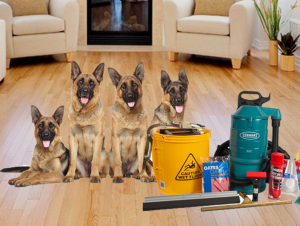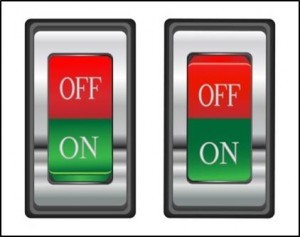Rebecca Lyles's Blog, page 5
October 24, 2015
Cleaning house with four dogs
 They’re at it again … the modifier-misplacers. Descriptive phrases create a special kind of confusion when they show up in the wrong place. Some might argue that no reasonable person would misunderstand today’s examples.
They’re at it again … the modifier-misplacers. Descriptive phrases create a special kind of confusion when they show up in the wrong place. Some might argue that no reasonable person would misunderstand today’s examples.
That’s not the point. Even if you can figure them out, they conjure oddly distracting visual images. Why give your reader a reason to snicker?
Recently, I read an online article about air fresheners. The writer said:
I just got a fantastic device that totally cleaned and freshened my house with four dogs.
I know dogs are loyal, intelligent, and lovable pets. Border collies are so smart they can round up herds of sheep and respond to dozens of special whistle commands. But, without opposable thumbs, how do they operate the vacuum cleaner? The sentence would have been clearer like this:
I just got a fantastic device that cleaned and freshened the air in my house. And I have four dogs!
A local newspaper article describes a chase following a burglary:
Police officers pursued the fleeing suspect on a bicycle.
I was thinking their squad car might have been faster, but the rest of the article implied it was the suspect who was on the bicycle. The report did say police officers (plural), and a bicycle (singular). The first image that popped into my head was two Keystone Cops on a tandem bike singing Bicycle Built for Two. Here’s what the writer might have said instead:
Police officers pursued the suspect, who fled on a bicycle.
Another newspaper article, about a parade, stated:
The band marched in the hot sun, carrying their instruments dressed in wool uniforms.
Again, the visual images. Is it ever so cold that you need a clarinet cozy? A saxophone sweater? A piccolo parka? (OK, that one’s just silly.) The point is that the musicians were wearing hot uniforms, not the instruments. One simple word—and—would have cleared it all up:
The band marched in the hot sun, carrying their instruments and dressed in wool uniforms.
Now that we have that all straightened out, I’m left with one question:
After the four dogs have tidied your house, who cleans up after them?
Like TextCPR on Facebook!
October 17, 2015
Do I have to?
 In all of Customer Service, one phrase should be stricken from every representative’s vocabulary:
In all of Customer Service, one phrase should be stricken from every representative’s vocabulary:
“You’ll have to …”
It’s usually followed by something like this:
wait in line
hold for a technician
fill out a form
start over
call back later
provide a receipt
… and so on
Childhood habits persist long into adulthood, often longer than we would like to admit. The first reaction most of us have to You’ll have to … is resistance. When we were children, authority figures (parents or teachers, for example) told us you’ll have to eat your vegetables, brush your teeth, do your homework, stay after school, or stop punching your sister. Most of us thought, even if we didn’t say it, Do I have to? or You gonna make me?
Part of being a mature adult is learning that we do indeed have to do many things we don’t like. Obey speed limits, pay our income taxes, put our trash bins away after collection day, and—yes—wait in line. But we do many of them grudgingly, muttering complaints under our breath. The desire to protest or resist is a natural feeling.
So why would you want to alienate anyone by saying, “You’ll have to …” anything? This advice is for DMV clerks, postal workers, IRS representatives, airport gate agents, receptionists, PTA committee chairmen, and virtually everyone else:
You can rephrase most negative statements in a positive way.
Try it. It makes all the difference.
We’ll serve you as soon as we can.
One of our technicians will help you in just a few minutes.
We need some information—here’s a form for you.
Let’s take this from the top.
The person you need to speak with will be in tomorrow.
Let’s see if we can verify your purchase.
Authority figure language puts us on guard and engages the prepare-to-fight-back response. So I’m not going to tell you that you’ll have to follow my suggestion.
You might ask me:
Do I have to do it?
No.
Are you going to make me?
No.
What happens if I don’t?
You’ll have to find out.
Like TextCPR on Facebook!
October 10, 2015
Just a couple of letters
 Like Venice, English might be in a state of elegant decay … sinking a couple of millimeters per year. Advocates for “doing what the people do” insist that, just because many people are slovenly in their habits, we should embrace their descent into anarchy. Proponents of trendy clichés, uptalk, and vocal fry whine that any sort of criticism is an attack on their freedom of speech.
Like Venice, English might be in a state of elegant decay … sinking a couple of millimeters per year. Advocates for “doing what the people do” insist that, just because many people are slovenly in their habits, we should embrace their descent into anarchy. Proponents of trendy clichés, uptalk, and vocal fry whine that any sort of criticism is an attack on their freedom of speech.
To them I say, “Meh—whateveeeer? Like, I’m so over iiiiit?”
The most disturbing trend is the tolerance for words that are clearly wrong, but close to the word that would make sense. Maybe just a letter or two off, but wrong nevertheless. The reader is responsible for making sense of the nonsensical, because the writer is careless or lazy.
Here are three examples I’ve recently seen in print:
Newspaper: We have quite a contingency of street people in our town …
Contingency means uncertain of occurrence, dependent on outside conditions. The writer meant contingent (group forming a part of a larger group).
Magazine: This film is gardenering attention …
It’s growing plants? No, it is garnering (gathering or collecting) attention.
Internet article: A video clip of a legislator, speaking about his fight for a bill he sponsored, followed by an article about the video. The article quoted him as saying, “I won’t be detoured from my goal …”
In the video, the man had said, “I won’t be deterred …” (discouraged, restrained). It’s possible that the reporter didn’t know the word deterred. Or maybe his Autocorrect was responsible. In any case, it was a misquote and someone should have noticed before it went public.
Thank goodness some of us were required to memorize great prose in elementary school. In the immortal words of Abraham Lincoln:
Floor store and severed tears ago our feathers bought fjords on this cotton net, canoe station conserved in liver tea, and dead dictated truth or preposition that almonds are crated sequel.
You knew what he meant, right?
Like TextCPR on Facebook!
October 3, 2015
Absolutely … not.
 A handful of English adjectives are considered absolutes. They cannot be compared. No degrees exist within them, and their application is a binary proposition. On or off. Yes or no, nothing in between.
A handful of English adjectives are considered absolutes. They cannot be compared. No degrees exist within them, and their application is a binary proposition. On or off. Yes or no, nothing in between.
These words behave like a simple light switch. No rheostat, no dimmer – just light or no light.
And yet people want to impose degrees on them that are not possible. The words sound impressive, but (since their correct usage would make the statement untrue) writers qualify them and think they’re getting away with something. These qualified absolutes often show up in advertising. Shocking, I know.
Here are some absolutes, common misuses, and what the writers could have said instead:
only (One. No more. There is no other.)
Not: one of the only
Say: one of the few
unique (One of a kind. Nothing else compares.)
Not: pretty unique
Say: distinctive, original
always (In every case. No exceptions.)
Not: nearly always
Say: usually, often
never (In no case. Not ever.)
Not: almost never
Say: seldom, rarely
dead (All life functions have ceased.)
Not: the victim was nearly dead
Say: gravely injured, near death
opposite (Antithetical. Mutually incompatible.)
Not: Her political ideas are almost completely opposite from mine.
Say: We disagree on most political issues.
In trying to explain sovereignty as an absolute concept, my college Government professor used the old sovereignty-pregnancy example, pointing out that you can’t be “a little bit” of either. The point was to respect the absolute nature of some words that cannot be qualified or compared. Students who failed to grasp this notion grew up to toss around perfect as if it just meant nice.
But be forewarned: If you claim to be practically perfect in every way, you’d better be Mary Poppins.
Like TextCPR on Facebook!
September 26, 2015
Indecent prepositions
 Somewhere in the dark recesses of your mind there’s probably an English teacher warning you not to end a sentence with a preposition. Although this and other outdated rules have fallen out of favor with modern communicators, they leave a vague feeling that we’re doing something to be ashamed of. (See what I did there?)
Somewhere in the dark recesses of your mind there’s probably an English teacher warning you not to end a sentence with a preposition. Although this and other outdated rules have fallen out of favor with modern communicators, they leave a vague feeling that we’re doing something to be ashamed of. (See what I did there?)
The contortions we go through in order to avoid ending sentences with prepositions are usually worse than just letting it happen. It’s reported that Winston Churchill once answered someone who scolded him for it, “Madam, that is one sort of criticism up with which I will not put.”
If you still cringe at breaking that ancient non-rule, here are some real examples and graceful ways to avoid the problem:
From company email about a conference:
At what time do you want to meet up at?
This writer started out with the awkward at what time construction, only to blow it by ending the sentence with at anyway.
Solution: Remove prepositions. All of them. What time do you want to meet?
From a published novel:
With whom did you go skydiving with?
Another case of forgetting (in the space of seven words) that the purpose of using with at the beginning was to avoid using it at the end.
Solution: You went skydiving? Holy cow! Who went with you? (The Holy cow! part is optional.)
From instructions on how to build web pages:
All child pages link to the page to which they’ve been made subpages of.
This writer could not decide whether the proper preposition was to or of, so he just used both for good measure.
Solution: Each child page links to its parent page.
My favorite story about sentence-ending prepositions goes like this:
A toddler went upstairs while his father selected a bedtime story to read to him. But the father chose a book with monsters in it, and the child didn’t like it. When daddy came into his room to tuck him in, the little boy said, “Oh no—what did you bring the book I didn’t want to be read to out of up for?”
Five in a row. Top that!
Like TextCPR on Facebook!
September 19, 2015
Sing, sink, and shrink
 These three English verbs have something in common. Besides all starting with “s,” I mean. For the past tense of sing, you occasionally hear people say, ”She sung all four verses of the Star Spangled Banner.” It doesn’t happen often, and the speaker isn’t usually a poster child for good grammar anyway.
These three English verbs have something in common. Besides all starting with “s,” I mean. For the past tense of sing, you occasionally hear people say, ”She sung all four verses of the Star Spangled Banner.” It doesn’t happen often, and the speaker isn’t usually a poster child for good grammar anyway.
But it’s alarming to hear Rhodes-scholar news commentators and respected TV journalists simply ignore the past tense forms of sink and shrink. I’m talking about statements such as these:
Today’s Senate vote all but sunk the party’s hopes for passage of the bill. (Should be sank.)
The ocean liner sunk off the coast of Italy, with many casualties. (Should be sank.)
His lead in the polls shrunk several points after the debate. (Should be shrank.)
I wonder if these reporters grew up watching Honey, I Shrunk the Kids? (Spoiler alert—should also be shrank.)
Each of these verbs has a present tense form, a past tense form, and a past participle. It might surprise some people to know that they are:
Present: sing
Past: sang
Past participle: sung
Present: sink
Past: sank
Past participle: sunk
Present: shrink
Past: shrank
Past participle: shrunk
In other words:
We sing songs around the campfire.
Last summer we sang every song we knew.
We’ve sung them all before.
x
Rescuers could do nothing but watch the ship sink.
It sank out of sight, leaving few survivors.
Two cruise ships have sunk in the same area.
x
Honey, did you shrink the kids?
Yes, I shrank them. Sorry ‘bout that.
You’ve obviously shrunk your brain too. This is grounds for divorce.
In 1989, someone at Disney made a conscious choice to use shrunk in the movie title instead of shrank, even though it was wrong. It just shows how impressionable children are. Years later, despite Oxford and Ivy League educations, these highly touted journalists still think shrunk is the past tense of shrink.
I wonder if they also believe in mermaids …?
Like TextCPR on Facebook!
September 12, 2015
Nice clean squids and the Bali Grill
 Most of them are typos and strange-sounding words we don’t understand. But even if we eliminate those, the internet has loads-o’-fun with restaurant menus. All (allegedly) real examples:
Most of them are typos and strange-sounding words we don’t understand. But even if we eliminate those, the internet has loads-o’-fun with restaurant menus. All (allegedly) real examples:
Snow crab legs and measles
Spicy cold children
Bean juice steams the sparerib
Kun Bow Pig Intestine
Hamburger with sheeps
The spicy field chicken
Steamed red crap with ginger
Most hilarious menu entries arise from misunderstood translations, phonetic spellings, and cultural disagreement over what constitutes food. But we always assume the menu writer meant something else, and we feel a secret smugness at knowing what the menu should say instead.
Not so fast, cowboy.
For years my BFF and I had a weekly ritual. Calamari and Chardonnay at the Bali Grill. Every Monday after work we met for gossip, encouragement, unsolicited advice … typical BFF therapy session. And every Monday we snickered about the menu description of our favorite appetizer:
Batter-dipped calamari
Nice clean squids, deep fried and served with chili jam
“Nice clean squids!” we chuckled, “As if a restaurant would claim to serve any other kind!”
Then, one dark day, the Bali Grill closed. We’d always enjoyed having the place to ourselves … apparently you can’t run a business on two customers a week. But what would we do now, without our calamari fix?
“Never fear!” my friend, a gourmet cook, announced. “We’ll make our own!”
So a dinner party was planned. My friend went to the fish market and bought several pounds of fresh, authentic calamari-on-the-hoof, so to speak. Although I had offered to help, my kitchen skills involve dusting my stove once a week, whether it needs it or not.
How hard could it be? I arrived mid-afternoon to help prepare for the dinner. Let’s just say the sink was full of the most disgusting, foul-smelling, scary-looking stuff I’ve ever seen. It looked like something the plumber would pull out of the garbage disposal after you fed it old tennis shoes and rubber gloves. And the cleaning process involved putting your hands in gray slime and goo and tentacles. Peer pressure is a powerful force. Not wanting to appear weak, I fought back the nausea and did my duty as the friend of a good cook. Through some magic (to which I contributed little), a lovely meal resulted.
But, every now and then, I think back to the menu at the Bali Grill. It was charming and it made us smile, but not because it was a cultural or language disconnect. The communication was correct. They were, indeed, nice clean squids, and someone had prepared them for us. Properly. They wanted us to know that. We always tipped generously, but if I’d known then what I know now, no tip would have been enough.
The lesson? Don’t be so quick to judge. You might be the one who is wrong. Just the same, I’d be tempted to order the hamburger with sheeps.
You know, just to see ….
Like TextCPR on Facebook!
September 5, 2015
Metaphorical mixology
 Metaphors figuratively (and indirectly) compare one person or thing to another—without using the word like. If you say My love is like a red, red rose, you’re using a simile, not a metaphor.
Metaphors figuratively (and indirectly) compare one person or thing to another—without using the word like. If you say My love is like a red, red rose, you’re using a simile, not a metaphor.
Metaphors are a little more sneaky. They slip in the characteristics of one person or thing when no one is looking, and another person or thing takes on an implied comparison. The moon was a ghostly galleon, tossed upon cloudy seas.
In The Highwayman, Alfred Noyes paints a picture in your mind. The moon looks like a sailing ship in your imagination, the sky looks like a turbulent ocean, and he never once used the word like.
Similes are straightforward. When you say I feel like a zombie, there’s little doubt about what you mean. But metaphors, perhaps because of their subtler nature, are subject to mixing and mismatching. A mixed metaphor is a succession of incongruous or illogical comparisons. It takes two or more references to create one. They often result from smashing two different clichés together to generate a confusing or laughable mental picture.
Legendary film producer Samuel Goldwyn is credited with this classic mixed metaphor:
“That’s the way with these directors. They’re always biting the hand that lays the golden egg.”
It combines the idea of biting the hand that feeds them (like an ungrateful dog) with killing the goose that lays the golden egg (destroying their source of livelihood).
Politicians and political commentators love to mix metaphors, and some are so colorful (though nonsensical) that they go viral:
“The alligators are in the swamp and it’s time to circle the wagons.”
It’s true that early settlers arranged their covered wagons in a circle to fend off attackers, but they were on prairies. Alligators in a swamp several states away would have been the least of their worries.
I recently saw a TV graphic for an upcoming news item. One of those teasers that entices you to stay tuned—because you don’t want to miss the story after the commercial!
It simply said:
“A tough nut to swallow”
The story was about a US Senator who had vigorously opposed some legislation, but it was passed anyway. The TV graphics person confused bitter pill to swallow (a big disappointment), which would have made sense, with tough nut to crack (a difficult problem to solve), which did not. Again, it’s about the mental picture.
Figurative language can be fun. Metaphors, mixed or otherwise, are often used in a tongue-in-cheek or humorous manner. But watch out for them if you’re trying to be serious or persuasive. If not used in accordance with package instructions, they can undermine your credibility and make you seem foolish.
Want to swallow a tough nut? Chop it up, add some eggs, sugar, baking soda, flour, and chocolate chips. Bake at 350 degrees until lightly browned. Cool, and then chew thoroughly.
Success is a marathon, but that’s just how the cookie crumbles.
Like TextCPR on Facebook!
August 29, 2015
Hold on!
 How often, when you call a business, are you forced to listen to someone else’s choice in music? Hold music exists to reassure you that someone has not forgotten you. That a live person will be with you shortly, because your call is important to them. And, by the way, it’s so important that it might be recorded for posterity. So just chill and listen to the music.
How often, when you call a business, are you forced to listen to someone else’s choice in music? Hold music exists to reassure you that someone has not forgotten you. That a live person will be with you shortly, because your call is important to them. And, by the way, it’s so important that it might be recorded for posterity. So just chill and listen to the music.
Last week I called a surgery center and was put on hold. I could not make this up—the hold music was Frank Sinatra singing I’ve Got You Under My Skin. Naturally, I envisioned an X-ray of surgical implements left inside a patient.
OK, maybe that wasn’t a natural reaction, but it was mine and it was disconcerting. It made me think of all the hold music that could either enhance or detract from the business you’re calling. If you’re in charge of a business or organization, here are some tips for choosing hold music.
Imagine you’re on hold for the business, and you’re listening to one of the Bad choices:
Dentist
Good—When You’re Smiling
Bad—I’ll Never Smile Again
Cancer Society
Good—Every Breath You Take
Bad—Smoke! Smoke! Smoke That Cigarette!
Alcoholics Anonymous
Good—I Walk the Line
Bad—Rum and Coca Cola, Tequila, Scotch & Soda, Red Red Wine, Drunk in Love, One Mint Julep, Beer Barrel Polka, Cocktails for Two, Piña Colada Song, Cold Gin, Cracklin’ Rosie, I’ll Drink to That, John Barleycorn, Knockin’ ’em Back, Liquor Store Blues, Poison Whiskey, Six Pack, White Lightning, Little Brown Jug, Longneck Bottle, Margaritaville, Rehab, Strawberry Wine, Tipsy, Just Another Tequila Sunrise, The Parting Glass, Have Some Madeira M’Dear, Bottoms Up, What Shall We Do With a Drunken Sailor, Yo Ho Ho and a Bottle of Rum, Red Solo Cup, Mountain Dew, Set ‘Em Up Joe, Two More Bottles of Wine
(So many. Could this be part of the problem …?)
UPS
Good—You Send Me
Bad—Return to Sender
National Earthquake Information Center
Good—In the Still of the Night
Bad—Whole Lotta Shakin’ Goin’ On
Hearing Aid store
Good—I Hear You Knockin’
Bad—What’d I Say?
Revlon Headquarters
Good—I Only Have Eyes for You
Bad—Maybellene
(I know the cosmetics company spells it differently, but that’s the spelling of the original 1955 hit by Chuck Berry)
Plastic surgeon
Good—Forever Young
Bad—Just the Way You Are
(Billy Joel or Bruno Mars, either one)
US Weather Service
Good—Here Comes the Sun
Bad—Stormy Weather
Marriage Counselor
Good—Stand By Me
Bad—D-I-V-O-R-C-E
Tanning Salon
Good—Girl From Ipanema
Bad—Whiter Shade of Pale
Self-help guru
Good—High Hopes
Bad—You Can’t Always Get What You Want
Mental Health Clinic
Good—Everything’s Gonna Be All Right
Bad—Crazy
After all, hold music provides potential customers or clients a few minutes to ponder the reason they’re calling you in the first place. If phone calls really are important to you, why give them a reason to reconsider before you’ve even answered?
Like TextCPR on Facebook!
August 22, 2015
You talkin’ to me?
 Before you get all offended that people don’t respond to your questions or greetings, make sure they know you’re addressing them. Because if you’re the person being addressed, you can’t always be sure you’re the target. Then what do you do?
Before you get all offended that people don’t respond to your questions or greetings, make sure they know you’re addressing them. Because if you’re the person being addressed, you can’t always be sure you’re the target. Then what do you do?
Robert DeNiro repeated the phrase, “You talkin’ to me?” in a movie as he practiced his gestures and facial expressions in front of a mirror. The scene is a classic for comedians and impressionists. His attitude was confrontational, but the question deserves an answer.
In the early days of cellular phone technology, I worked for AT&T Wireless. Long before certain advances were available to the public, my co-workers walked around the AT&T campus testing pre-release versions of handsets, antennas, and network features. Some of these developments were under wraps and so secret that only the project engineers and a few testers knew about them. At least that makes me feel a little better about my Awkward Incident.
At the time of the Incident, cell phones were about the size of a submarine sandwich and you couldn’t talk to someone without holding the handset to your ear. As I walked across the courtyard to another building, an employee (with nothing in his hands) approached me from the other direction, saying, “Hello, how are you today?” I smiled brightly and said, “Fine, thank you.” He rolled his eyes, then gave me a withering look … as he pointed to a wireless earpiece and a tiny device in his shirt pocket. How was I to know he was testing hands-free features with a new, incredibly small handset?
A few days later I went to the post office in a windy downpour, raincoat collar upturned and umbrella shielding my face. A guy approached from the other direction and I heard him say, “Well hellooooo!” as if he had just seen an old friend. Still smarting from my previous embarrassment, I kept my umbrella lowered and continued walking. I didn’t know him. Why would he be talking to me? About the time I reached the door, I heard him bellow after me, “You stuck-up b*tch!”
Have you ever been in a crowd and waved back at someone who was actually waving at the person behind you? Or accidentally cut someone off in traffic, immediately wanted to apologize, but the other driver gave you an obscene gesture? Goodness knows there are enough hand signals for obscenities. What we need are some universal signs that say:
Hello if you’re talking to me, but if you’re not, have a nice day anyway.
Are you waving at me? Because I don’t think I know you …
I’m sorry. Please don’t report me to the Highway Patrol.
The danger is that someone, not understanding the hand signal, might take offense. Then we would need a signal to say:
“I’m sorry you didn’t understand my previous hand signal apologizing for being sorry that … oh, forget it.”
Like TextCPR on Facebook!



